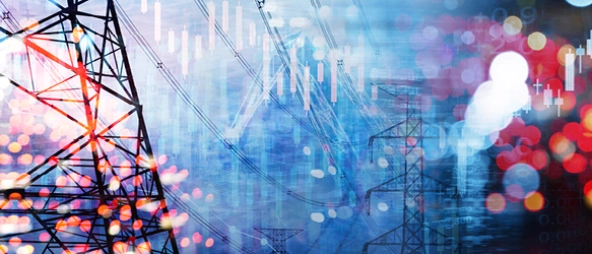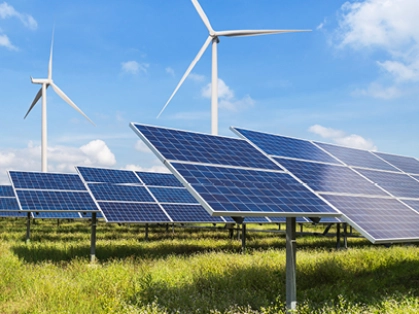Information on the current energy market situation
The current political situation strongly impacts the already tense and volatile energy market. The procurement costs that all energy suppliers have to pay for electricity and also for natural gas have fallen in recent weeks and months, but are still on a high level and simultaneously subject to significant fluctuations.

Energy price brake for electricity
In order to release customers in some measure from the burden of high energy prices, the federal government has decided on price brakes for electricity, natural gas and heat.

Save energy
With every kilowatt hour you save, you reduce your electricity costs. That's why you should know how high the energy consumption of each electronic device really is.

Omission of the EEG surcharge
With the omission of the EEG surcharge, we reduced all our electricity prices by the amount of levy as of July 1st 2022. Here you will find the most frequently asked questions and answers regarding the topic.
Fakten und Zahlen monitoring
Further information on our products
+ 143.1%
The average wholesale price for electricity in 2022 of 235.45 Euro/MWh was significantly higher than the one in 2021 (+143,1 percent).
Quelle: Bundesnetzagenur 02.01.2023
46.0%
In the fourth quarter of 2022, the share of renewable energies in German energy consumption increased to a 46%.
Source: Bundesnetzagentur 17.01.2023
263.2 Billion
kilowatt hours of electricity were fed into the grid in Germany during the first half of 2022. This was 1.3% more than during the first half of 2021 .
Source: Statistisches Bundesamt 7.9.2022
263.2 Billion
kilowatt hours of electricity were fed into the grid in Germany during the first half of 2022. This was 1.3% more than during the first half of 2021 .
Source: Statistisches Bundesamt 7.9.2022
Electricity: Taxes, levies and fees 2023
Dues payed to the municipalities in order to be able to use public roads and areas for pipelines. The amount of the concession fee varies depending on the type of gas supply and the number of inhabitants in the municipiality. The Ordinance on Concession Charges for Electricity and Gas (Konzessionsabgabenverordnung - KAV) constitutes the basis for this.
The electricity tax is one of the consumption taxes regulated by the federal law. It is levied on electricity in the German tax territory. The Electricity Tax Act (StromStG) as well as the Electricity Tax Implementation Ordinance (StromStV) constitute the legal basis for levying the electricity tax.
As a customer of the Stadtwerke Energie Jena-Pößneck, you pay the electricity tax at the statutory rate on every kilowatt hour consumed, as do almost all consumer throughout Germany. The standard tax rate (e.g. for household customers) is 2.05 cents (net) per kilowatt hour.
The VAT is due on the net prices. Currently, the tax on electricity consumption is 19 percent.
The revenue from the KWKG levy is used to cover the corresponding costs arising from the promotion of combined heat and power plants.
Pursuant §§ 26a und 26b of the Combined Heat and Power Act (Kraft-Wärme-Kopplungsgesetz (KWKG)), the German transmission system operators are obliged to determine the KWKG levy for the following calendar year in a transparent manner and to publish it each year by 25th of October. The annual accounts of the previous calendar years are taken into account accordingly when determining the KWKG levy.
| 2023 | 2024 |
| 0.357 Cent/kWh | 0.275 Cent/kWh |
According to the Electricity Grid Charges Ordinance (Stromnetzentgeltverordnung (StromNEV)) of 25th July 2005, which was last amended by Article 6 of the Act of 20th July 2022 (BGBI. I S. 1237), final consumers may apply for an individual grid charge pursuant to §19 para. 2 sentence 1 or sentence 2 StromNEV. Likewise, §118 para. 6 sentence 9 EnWG provides for an exemption from grid access charges for, among others, plants that produce hydrogen through water electrolysis. The transmission system operators are obliged to reimburse downstream operators of electricity distribution systems for lost revenues resulting from the exemption from grid access charges of the aforementioned plants or from individual grid access charges. The transmission system operators must compensate each other for these payments and their own lost revenues. The lost revenues are allocated proportionately to all final consumers as a surcharge on the network charges (§19 StromNEV-Umlage).
| 2023 | 2024 |
| 0.417 Cent/kWh | 0.403 Cent/kWh |
The revenues from the offshore network levy are used to cover the corresponding costs arising from compensation in the event of disruptions or delays in the connection to offshore plants as well as the costs from the construction and operation of the offshore connection lines.
| 2023 | 2024 |
| 0.591 Cent/kWh | 0.656 Cent/kWh |
Netzentgelte sind auf Grundlage der Regulierungsbehörde kalkulierte Gebühren, die vom jeweiligen Netzbetreiber für die Nutzung seiner Stromnetzte zur Lieferung der Energie zum Kunden erhoben werden. Damit werden u. a. der Bau, die Instandhaltung und der Ausbau der Stromnetze finanziert.
Der zuständige Netzbetreiber veröffentlicht die jeweils geltende Höhe der Netzentgelte auf seiner Internetseite.

Current values for electricity price components
The fixed levies, charges and taxes on the electricity price are included in the offer prices.
General and contact information for people in socially vulnerable situations
Should you worry or fear no longer being able to cover incurring (energy)-costs, it might be possible to receive benefits to cover subsistence costs via the jenarbeit - job center of the city of Jena or via the social services department of the city of Jena.
download Contacts
You have questions?
You can reach our customer service team at:


